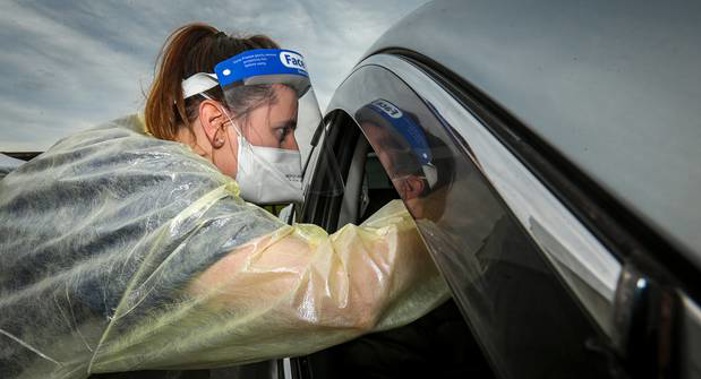
Experts say the latest case numbers show the Omicron outbreak in New Zealand is accelerating but they're likely to be the tip of the iceberg.
"When we're at the steep part of the curve, the actual number of infections are much higher than what we're measuring," says University of Otago epidemiologist Michael Baker.
The country saw relatively slow transmission initially, taking about five days for case numbers to double but this is now getting shorter, leading to a steady rise in the positivity rate, he said.
"What's really driving it is the number of people getting infected."
University of Auckland Associate Professor Siouxsie Wiles says the increase is expected and it's now on people to try and slow down transmission – by getting vaccinated, boosted, and wearing masks indoors.
"This many cases after a Sunday shows the exponential spread is well and truly on its way," she said.
Hospitalisation numbers are also on the rise. "That's what we'll be watching really."
The Herald is requesting Health Ministry data on the latest positivity rate.
Baker says the World Health Organisation uses a 5 per cent positivity rate as an indicator that an outbreak is very widespread.
Health data shows the majority of cases are in Auckland but the rest of the country will be catching up in the next one to two weeks, he said.
"Particularly for people in Auckland who are more vulnerable, and older people, now is the time to be taking extra precautions to limit your contact with other people indoors," he said.
As case numbers go up the Northern Region Health Co-ordination Centre (NRHCC) is urging Aucklanders to check whether they need a test.
This is to make sure testing resources are focused on those who need to be tested, said NRHCC chief clinical officer Dr Andrew Old.
Currently, people who need to be tested are those who have Covid symptoms (fever, cough, scratchy throat, shortness of breath, sneezing and runny nose), are a close contact, and have returned a positive RAT test.
Also in the list are people under a mandatory testing order, work directly with Covid patients, have been told to get a test by a health official or when being treated at public hospital.
"If you have no symptoms of Covid-19 and do not meet any other criteria, you do not need to be tested. In order to manage demand, people who do not meet the criteria may be turned away," Old said.
"We are expecting high demand at Auckland's 17 community testing centres over the next few days and weeks, so are encouraging anyone coming to be prepared for a wait, for example by bringing food and water, and games or books for children to make the wait easier."
People can help speed up the process by bringing ID and having their NHI numbers ready to give to staff.
"We understand that extended waiting times can be frustrating but we ask that you are patient with our testing staff who are working as quickly and as carefully as they can," he said.
People who have taken a test are required to stay home until they receive a negative result.
Old said most results are returned within one to two days but can take longer.
"If you have not been notified of your result after five days, contact your GP or primary care provider."
Take your Radio, Podcasts and Music with you









